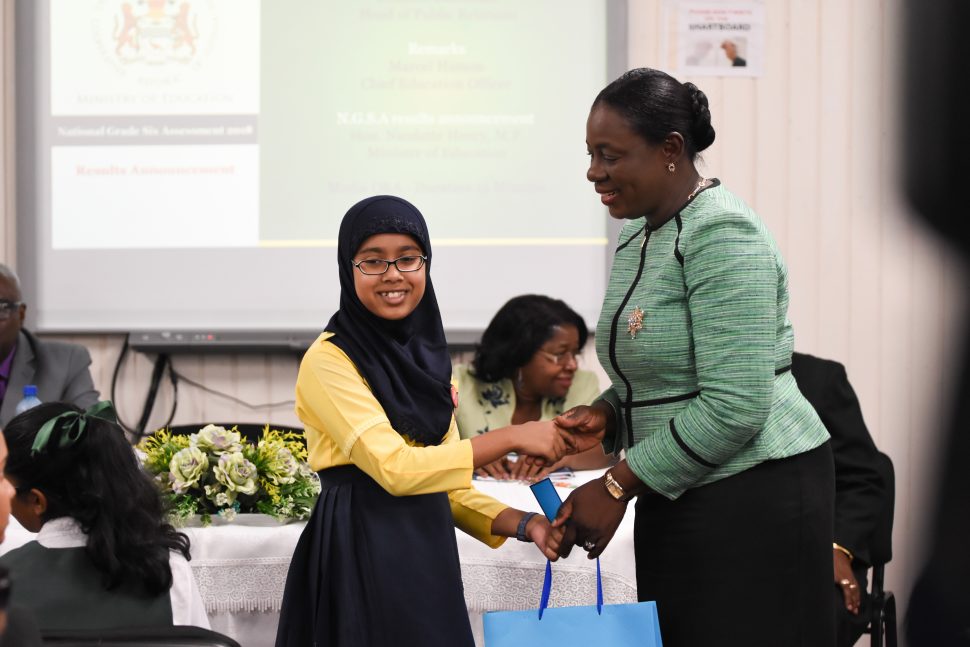Although passes in English at this year’s National Grade Six Assessment (NGSA) saw a rise to 60%, it is the only subject in which a pass rate was recorded above 50% as only 46% of the 14,145 students who sat the exams in March earned passes in Science and Social Studies, while a mere 38% passed Mathematics.
Notably, while English saw an increase of almost 6% in the pass rate and Social Studies a decrease of 1%, Mathematics, which has been the focus of millions of dollars in remedial interventions, saw a decrease in its pass rate by approximately 7%.
A 13.85% pass rate in Mathematics in 2016 saw President David Granger issuing a directive which materialised as the $49 million Emergency Mathematical Intervention Plan, which officials claimed resulted in an across-the-board improvement in 2017.
Minister of Education Nicolette Henry is, however, undaunted by this development. She told reporters yesterday that the interventions were like an initial administration of medicine and that booster shots will continue to be necessary. She repeatedly stressed that government has invested money and time into education and noted that results come at the end of a process.
“We recognise that we have to invest in our own people and, so, that requires us recruiting additional supporting staff [and] developing and strengthening the existing programmes to result in the kind of results that you see today. It’s not only specific to English. Last year, as you are aware, we did the intervention, which was intended to improve results and, so, it’s very important that you understand results come out of a process. It just doesn’t appear. It is representative of the hard work of a lot of people,” she said, while adding the government decided to invest more in education, which she claimed used to account for less than 20% of the national budget.
According to Henry, programmes, such as the Bus, Boats, Bicycles, Books and Breakfast (5 Bs) initiative and the teenage mothers reintegration policy, are not political rhetoric but strategies aimed at ensuring benefits for the people through an improved education system.
Specific attention was drawn to the fact that students from regions One, Seven, Eight and Nine do not appear in the top 1% of the results, while for yet another year private school candidates make up a significant percentage of the top 1%.
Chief Education Officer Marcel Hutson explained that one of the things affecting the performance of hinterland students is the quality of teachers and he noted that the ministry has established satellite teaching training centres in several of those areas to address this issue. A centre opened in Region Eight earlier this year has an enrollment of approximately 50, he said.
Additionally, the ministry’s budget for next year will be catering for the establishment of several smart classrooms, which will allow for the use of technology to bridge the learning gap between the coast and hinterland regions, while efforts are being made to encourage parents to take an active role in their children’s education. “With the number of projects and the kind of money invested, it is only a matter of time until you see the change,” Hutson stressed.
The 2018 NGSA was written on the 28th and 29th of March. For the third year, the Ministry of Education has collaborated with the Caribbean Examinations Council (CXC) to improve the quality of all primary grade assessments. Teachers, subject specialists and test development officers developed the test items with the technical guidance of CXC addressing key areas, such as item construction, weighting of items, sampling and other psychometric elements. Students were tested in four subject areas: Mathematics, English, Science and Social Studies. The highest attainable score in both Social Studies and Science was 132 and in Mathematics it was 136, while the maximum attainable score in English was 129.
Areas tested for each subject include knowledge, algorithmic thinking and reasoning for Mathematics; knowledge, comprehension and application for Science; knowledge, conceptual understanding and use of knowledge for Social Studies; and reading, comprehension and vocabulary, structure and mechanics, content, focus, vocabulary language and organisation for English language.










